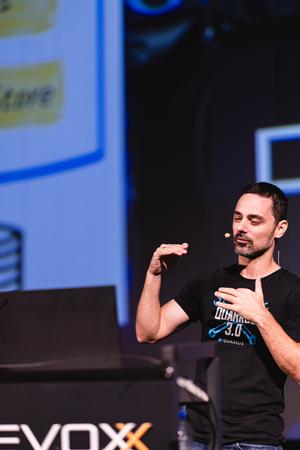 GenAI & Beyond
GenAI & BeyondConference50min
From AI-Infused to Agentic: Building an Enterprise Agentic Framework
This talk traces the evolution from simple LLM wrappers to advanced agentic frameworks, highlighting challenges in memory, context, and interoperability. It covers key patterns like function calling, planning, and workflow orchestration, shares architectural lessons learned, and provides practical insights for building or understanding modern autonomous AI agents.

Georgios AndrianakisIBM

Mario FuscoIBM
Clement EscoffierRed Hat
talkDetail.whenAndWhere
Wednesday, October 8, 17:50-18:40
Room 10
Over the past year, the rise of agentic architectures has pushed the boundaries of how we design AI-infused applications. What began as simple wrappers around large language models has evolved into more autonomous, stateful, and interactive systems, agents capable of planning, invoking tools, and collaborating.
In this talk, we’ll share our journey from building traditional AI-enhanced services to designing a full-fledged agentic framework. Along the way, we faced new design challenges: How should we model local and long-term memory? How do we represent multi-turn exchanges while preserving context and state? What protocols are needed for interoperability, such as the Model Context Protocol (MCP) or Agent-to-Agent communication, and how do they fit together? What about observability, security, auditing, and developer experience?
We’ll walk through the core concepts and patterns we explored, including function calling, memory management, supervision, planning, and workflow orchestration. We’ll discuss the architectural trade-offs we encountered and the lessons we learned along the way. Whether you’re building your own agent framework or just curious about what makes agents different, this talk will offer practical insights from the trenches.
In this talk, we’ll share our journey from building traditional AI-enhanced services to designing a full-fledged agentic framework. Along the way, we faced new design challenges: How should we model local and long-term memory? How do we represent multi-turn exchanges while preserving context and state? What protocols are needed for interoperability, such as the Model Context Protocol (MCP) or Agent-to-Agent communication, and how do they fit together? What about observability, security, auditing, and developer experience?
We’ll walk through the core concepts and patterns we explored, including function calling, memory management, supervision, planning, and workflow orchestration. We’ll discuss the architectural trade-offs we encountered and the lessons we learned along the way. Whether you’re building your own agent framework or just curious about what makes agents different, this talk will offer practical insights from the trenches.

Georgios Andrianakis
Georgios works for IBM as a Senior Principal Software Engineer and is currently one of the most active contributors of Quarkus, where he works in all sorts of areas, including but not limited to LangChain4j, RESTEasy Reactive, Spring compatibility, Kubernetes support, testing, Kotlin and more.
He is also an enthusiastic promoter of Quarkus that never misses a chance to spread the Quarkus love!
He is also an enthusiastic promoter of Quarkus that never misses a chance to spread the Quarkus love!

Mario Fusco
Mario is a senior principal software engineer at IBM working as Drools project lead. Among his interests there are also high performance systems and generative AI, being an active contributor of widely adopted projects like Quarkus and LangChain4j. He is also a Java Champion, the JUG Milano coordinator, a frequent speaker and the co-author of "Modern Java in Action" published by Manning.
Clement Escoffier
Clement Escoffier (@clementplop) is a distinguished engineer at Red Hat and co-lead of the Quarkus project. He is a Java Champion. Before joining Red Hat, Clement had several professional lives, from academic positions to management. He contributed to projects and products, touching many domains and technologies such as OSGi, mobile, continuous delivery, and DevOps. Clement has always been interested in software engineering, distributed systems, and event-driven architecture. He recently focused on Reactive Systems, Cloud-Native applications, and Kubernetes. Clement contributed to many open-source projects, such as Apache Felix, Eclipse Vert.x, SmallRye, Mutiny, and Quarkus. He also authored the "Reactive Systems in Java" book.

talkDetail.transcript.loginToSeeTakeaways
talkDetail.transcript.loginToSeeInsights
comments.speakerNotEnabledComments